Donald J. Trump is sworn in as the nation's 47th president in historic inauguration
Published in News & Features
WASHINGTON — Donald J. Trump took the oath of office to become the 47th president of the United States on Monday, capping an extraordinary political comeback and promising to “make America greater, stronger and far more exceptional than ever before.”
Trump became only the second person in the nation’s history to regain the White House after losing it — following Grover Cleveland, the first Democrat to become president after the Civil War and the last to hold the post before the dawn of the 20th century.
Trump’s ascension to the most powerful office in the world represented an astounding comeback for a man twice impeached during his first term, then held liable for both civil and criminal misconduct during the years he tried to regain the White House.
The former businessman and reality TV host boasted an approval rating above 50% as he took office, according to two polls, higher than at any time since his extraordinary but divisive rise to power in 2016.
Every former president attended the ceremony — Bill Clinton, George W. Bush and Barack Obama. They were joined by world leaders, including former British Prime Minister Boris Johnson and recently elected Argentinian President Javier Milei.
The chief executives of Meta, X, and Amazon sat in front of the president’s entire Cabinet — a nod to the importance Trump has given the heads of some of the most powerful companies and social media platforms over his agency heads.
Also occupying prime seats — conservative political icons, including ultimate fighting impresario Dana White and Joe Rogan, the online commentator.
Trump takes over from President Biden, who met with his successor at the White House, before proceeding by motorcade to the U.S. Capitol for Trump’s swearing in and inaugural speech. The well-recorded animosity between the two men remained veiled under a polite veneer.
The two men followed protocols in place for more than 200 years of American history, as did outgoing and incoming Cabinet members, lawmakers and members of the U.S. Supreme Court.
Yet the scene also felt remarkable, coming four years after Trump’s followers stormed the same Capitol building and attempted to halt Congress’ certification of the 2020 election — based on the inaccurate claim that the Republican had been cheated out of the presidency.
Trump subsequently declined to attend Biden’s 2021 inauguration, also breaking with norms that had made the U.S. and its democracy the envy of much of the world.
Also extraordinary: Biden’s action in the final hours of his presidency to issue preemptive pardons to protect some of Trump’s best-known adversaries from the retribution that the incoming president promised to unleash once he returned to power.
Pardoned by Biden early Monday were Dr. Anthony Fauci, a top medical advisor to Biden; Gen. Mark Milley, the former chairman of the Joint Chiefs of Staff; and Liz Cheney, a former Wyoming congresswoman who joined Democrats in trying to remove Trump from office.
“I believe in the rule of law, and I am optimistic that the strength of our legal institutions will ultimately prevail over politics,” Biden said in a statement. “But these are exceptional circumstances, and I cannot in good conscience do nothing. Baseless and politically motivated investigations wreak havoc on the lives, safety and financial security of targeted individuals and their families.
“Even when individuals have done nothing wrong — and in fact have done the right thing — and will ultimately be exonerated, the mere fact of being investigated or prosecuted can irreparably damage reputations and finances,” the outgoing president added.
The ceremony was moved into the Capitol rotunda because of subfreezing temperatures forecast for Washington, making Trump one of the few presidents to take the oath of office indoors.
“I don’t want to see people hurt, or injured, in any way,” Trump said Friday in a Truth Social post. “Therefore, I have ordered the Inauguration Address, in addition to prayers and other speeches, to be delivered in the United States Capitol Rotunda, as was used by Ronald Reagan in 1985, also because of very cold weather.”
Trump’s second inauguration is historic in several ways. He becomes only the second president to win nonconsecutive terms: the other, Grover Cleveland, won elections in 1884 and 1892. He also will become the only president who was impeached twice and is a convicted felon.
The rotunda was among the areas of the Capitol complex ransacked four years ago by Trump supporters seeking to disrupt certification of the 2020 election won by Joe Biden.
Inauguration Day will begin for Trump with a service at St. John’s Episcopal Church, site of a famous photo opportunity in 2020, where Trump held up a Bible after clearing Black Lives Matter protesters from the nearby park. After church, Trump is scheduled to join his wife, Melania Trump, for tea at the White House with President Biden and First Lady Jill Biden.
For the more intimate swearing-in ceremony at the Capitol, Trump is expected to be joined by a cadre of his closest advisors and allies, including several tech executives who have donated handsomely to his campaign.
Most of the people who flocked to the nation’s capital to witness the event in person have been relegated to the Capital One Arena, a sports venue nearby, for a livestream of the official ceremony. Trump said in his Truth Social post that he plans to join the crowd at the arena for the presidential parade. He also hosted a campaign-style rally there Sunday afternoon, to a smaller audience. Trump is expected to finish the day with a dizzying schedule of three inauguration balls.
Trump takes office amid a high point for the Republican Party, which won control of the House and Senate in November’s election. Already, congressional leaders have begun implementing Trump’s policy priorities. Immediately following the inauguration, the Senate is scheduled to take up consideration of the Laken Riley Act, the first of many border security bills expected to come under the Republican-led Congress.
The Senate has been busy the past week with confirmation hearings for Trump’s Cabinet picks. The widely televised hearings have given Democrats a chance to sharply question his nominees, foreshadowing a combative four years.
As in his first campaign, Trump’s run for office in 2024 hinged on his promise to crack down on illegal immigration at the border and corruption in Washington. Trump is expected to begin his first hours in office by signing a slew of executive orders, including many aimed at tightening rules on immigration and possibly initiating a mass deportation.
California’s leaders have already begun preparing a counteroffensive to Trump’s policy aims. Gov. Gavin Newsom convened a special legislative session for the state’s leaders to prepare for Trump’s presidency, and Atty. Gen. Rob Bonta said his office was readying lawsuits to challenge any of Trump’s policy measures they considered unlawful or unconstitutional.
©2025 Los Angeles Times. Visit at latimes.com. Distributed by Tribune Content Agency, LLC.
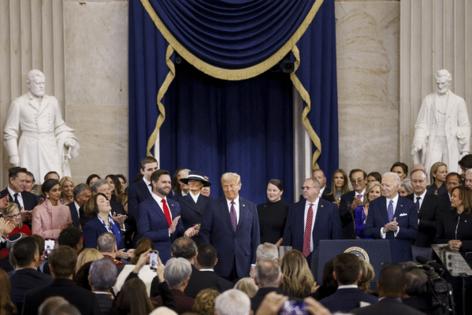
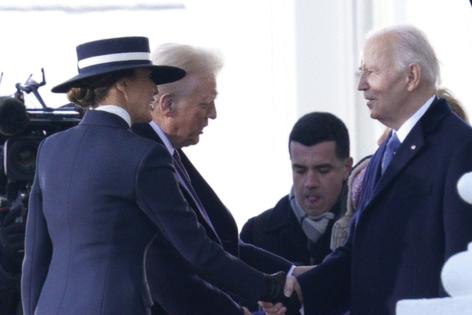
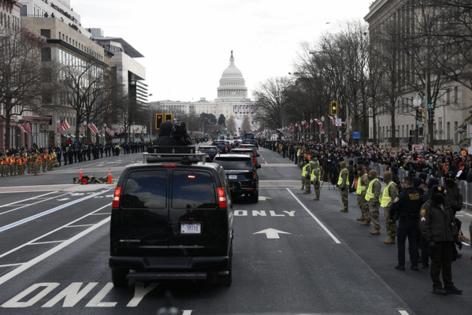
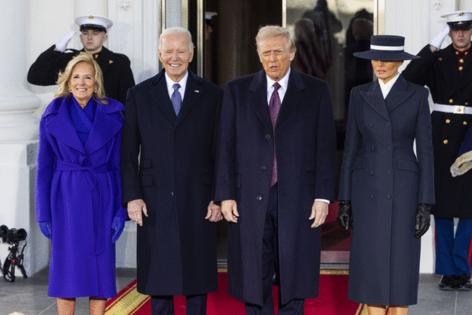
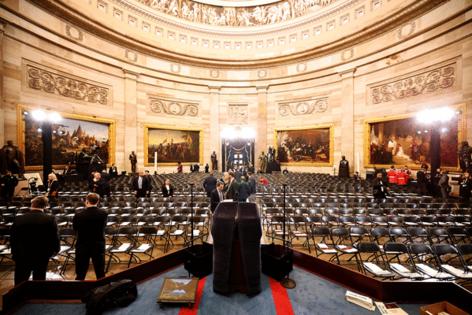











Comments